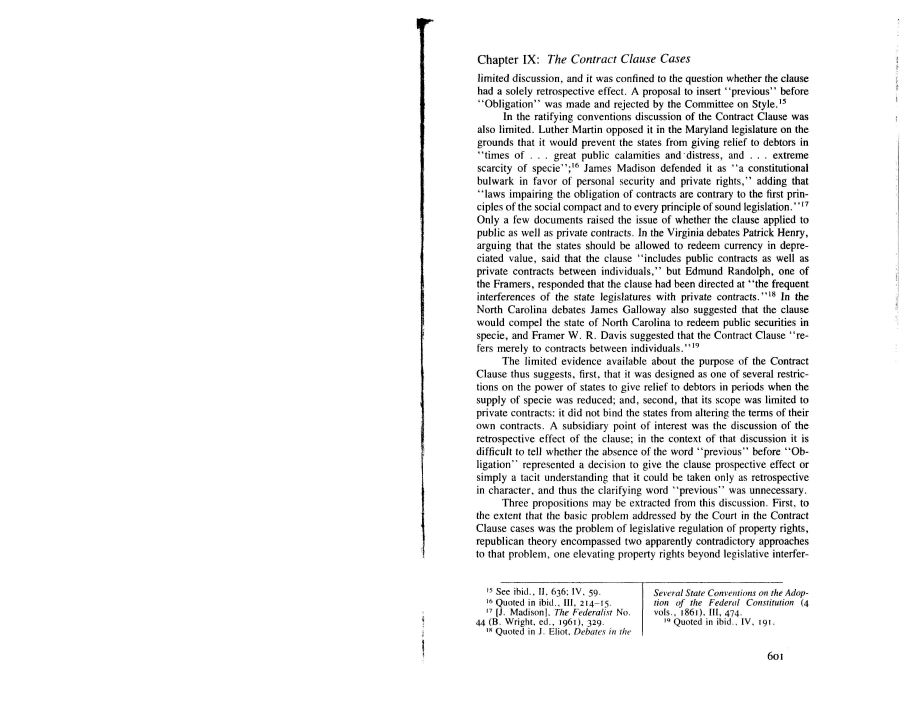|
Chapter IX: The Contract Clause Cases
limited discussion, and it was confined to the question whether the clause
had a solely retrospective effect. A proposal to insert "previous" before
"Obligation" was made and rejected by the Committee on Style.15
In the ratifying conventions discussion of the Contract Clause was
also limited. Luther Martin opposed it in the Maryland legislature on the
grounds that it would prevent the states from giving relief to debtors in
"times of ... great public calamities and distress, and . . . extreme
scarcity of specie";16 James Madison defended it as "a constitutional
bulwark in favor of personal security and private rights," adding that
"laws impairing the obligation of contracts are contrary to the first prin-
ciples of the social compact and to every principle of sound legislation."17
Only a few documents raised the issue of whether the clause applied to
public as well as private contracts. In the Virginia debates Patrick Henry,
arguing that the states should be allowed to redeem currency in depre-
ciated value, said that the clause "includes public contracts as well as
private contracts between individuals," but Edmund Randolph, one of
the Framers, responded that the clause had been directed at "the frequent
interferences of the state legislatures with private contracts."18 In the
North Carolina debates James Galloway also suggested that the clause
would compel the state of North Carolina to redeem public securities in
specie, and Framer W. R. Davis suggested that the Contract Clause "re-
fers merely to contracts between individuals."19
The limited evidence available about the purpose of the Contract
Clause thus suggests, first, that it was designed as one of several restric-
tions on the power of states to give relief to debtors in periods when the
supply of specie was reduced; and, second, that its scope was limited to
private contracts: it did not bind the states from altering the terms of their
own contracts. A subsidiary point of interest was the discussion of the
retrospective effect of the clause; in the context of that discussion it is
difficult to tell whether the absence of the word "previous" before "Ob-
ligation" represented a decision to give the clause prospective effect or
simply a tacit understanding that it could be taken only as retrospective
in character, and thus the clarifying word "previous" was unnecessary.
Three propositions may be extracted from this discussion. First, to
the extent that the basic problem addressed by the Court in the Contract
Clause cases was the problem of legislative regulation of property rights,
republican theory encompassed two apparently contradictory approaches
to that problem, one elevating property rights beyond legislative interfer-
15 See ibid., II, 636; IV, 59.
16 Quoted in ibid., Ill, 214-15.
17 [J. Madison], The Federalist No.
44 (B. Wright, ed., 1961), 329.
18 Quoted in J. Eliot, Debates in the
Several State Conventions on the Adop-
tion of the Federal Constitution (4
vols., 1861), III, 474.
19 Quoted in ibid., IV, 191.
601
|

